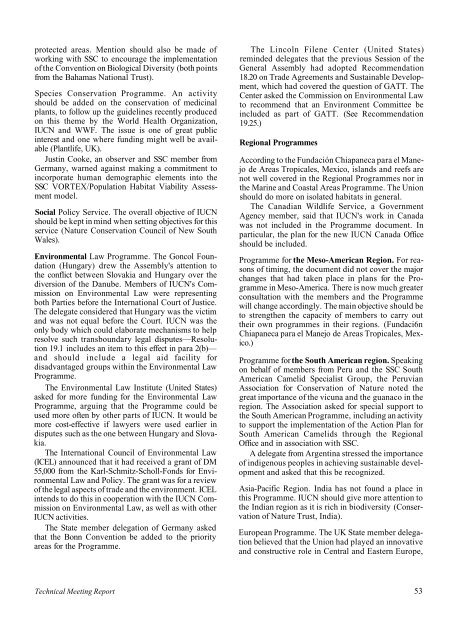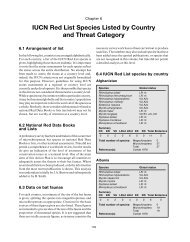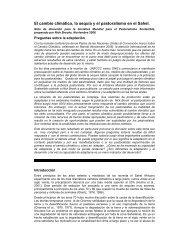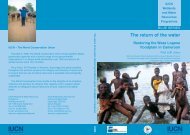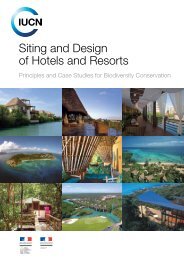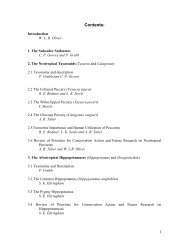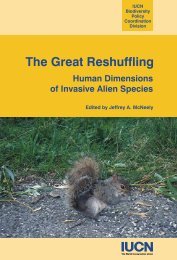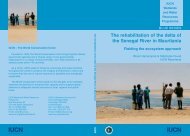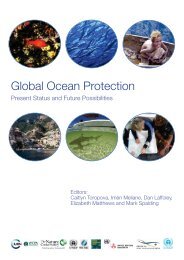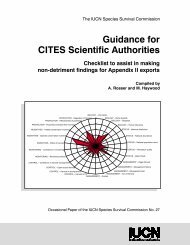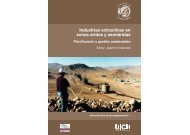Buenos Aires, Argentina - IUCN
Buenos Aires, Argentina - IUCN
Buenos Aires, Argentina - IUCN
You also want an ePaper? Increase the reach of your titles
YUMPU automatically turns print PDFs into web optimized ePapers that Google loves.
protected areas. Mention should also be made of<br />
working with SSC to encourage the implementation<br />
of the Convention on Biological Diversity (both points<br />
from the Bahamas National Trust).<br />
Species Conservation Programme. An activity<br />
should be added on the conservation of medicinal<br />
plants, to follow up the guidelines recently produced<br />
on this theme by the World Health Organization,<br />
<strong>IUCN</strong> and WWF. The issue is one of great public<br />
interest and one where funding might well be available<br />
(Plantlife, UK).<br />
Justin Cooke, an observer and SSC member from<br />
Germany, warned against making a commitment to<br />
incorporate human demographic elements into the<br />
SSC VORTEX/Population Habitat Viability Assessment<br />
model.<br />
Social Policy Service. The overall objective of <strong>IUCN</strong><br />
should be kept in mind when setting objectives for this<br />
service (Nature Conservation Council of New South<br />
Wales).<br />
Environmental Law Programme. The Goncol Foundation<br />
(Hungary) drew the Assembly's attention to<br />
the conflict between Slovakia and Hungary over the<br />
diversion of the Danube. Members of <strong>IUCN</strong>'s Commission<br />
on Environmental Law were representing<br />
both Parties before the International Court of Justice.<br />
The delegate considered that Hungary was the victim<br />
and was not equal before the Court. <strong>IUCN</strong> was the<br />
only body which could elaborate mechanisms to help<br />
resolve such transboundary legal disputes—Resolution<br />
19.1 includes an item to this effect in para 2(b)—<br />
and should include a legal aid facility for<br />
disadvantaged groups within the Environmental Law<br />
Programme.<br />
The Environmental Law Institute (United States)<br />
asked for more funding for the Environmental Law<br />
Programme, arguing that the Programme could be<br />
used more often by other parts of <strong>IUCN</strong>. It would be<br />
more cost-effective if lawyers were used earlier in<br />
disputes such as the one between Hungary and Slovakia.<br />
The International Council of Environmental Law<br />
(ICEL) announced that it had received a grant of DM<br />
55,000 from the Karl-Schmitz-Scholl-Fonds for Environmental<br />
Law and Policy. The grant was for a review<br />
of the legal aspects of trade and the environment. ICEL<br />
intends to do this in cooperation with the <strong>IUCN</strong> Commission<br />
on Environmental Law, as well as with other<br />
<strong>IUCN</strong> activities.<br />
The State member delegation of Germany asked<br />
that the Bonn Convention be added to the priority<br />
areas for the Programme.<br />
The Lincoln Filene Center (United States)<br />
reminded delegates that the previous Session of the<br />
General Assembly had adopted Recommendation<br />
18.20 on Trade Agreements and Sustainable Development,<br />
which had covered the question of GATT. The<br />
Center asked the Commission on Environmental Law<br />
to recommend that an Environment Committee be<br />
included as part of GATT. (See Recommendation<br />
19.25.)<br />
Regional Programmes<br />
According to the Fundación Chiapaneca para el Manejo<br />
de Areas Tropicales, Mexico, islands and reefs are<br />
not well covered in the Regional Programmes nor in<br />
the Marine and Coastal Areas Programme. The Union<br />
should do more on isolated habitats in general.<br />
The Canadian Wildlife Service, a Government<br />
Agency member, said that <strong>IUCN</strong>'s work in Canada<br />
was not included in the Programme document. In<br />
particular, the plan for the new <strong>IUCN</strong> Canada Office<br />
should be included.<br />
Programme for the Meso-American Region. For reasons<br />
of timing, the document did not cover the major<br />
changes that had taken place in plans for the Programme<br />
in Meso-America. There is now much greater<br />
consultation with the members and the Programme<br />
will change accordingly. The main objective should be<br />
to strengthen the capacity of members to carry out<br />
their own programmes in their regions. (Fundaci6n<br />
Chiapaneca para el Manejo de Areas Tropicales, Mexico.)<br />
Programme for the South American region. Speaking<br />
on behalf of members from Peru and the SSC South<br />
American Camelid Specialist Group, the Peruvian<br />
Association for Conservation of Nature noted the<br />
great importance of the vicuna and the guanaco in the<br />
region. The Association asked for special support to<br />
the South American Programme, including an activity<br />
to support the implementation of the Action Plan for<br />
South American Camelids through the Regional<br />
Office and in association with SSC.<br />
A delegate from <strong>Argentina</strong> stressed the importance<br />
of indigenous peoples in achieving sustainable development<br />
and asked that this be recognized.<br />
Asia-Pacific Region. India has not found a place in<br />
this Programme. <strong>IUCN</strong> should give more attention to<br />
the Indian region as it is rich in biodiversity (Conservation<br />
of Nature Trust, India).<br />
European Programme. The UK State member delegation<br />
believed that the Union had played an innovative<br />
and constructive role in Central and Eastern Europe,<br />
Technical Meeting Report 53


